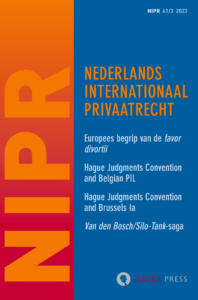Dutch Journal of PIL (NIPR) – issue 2023/3
The latest issue of the Dutch Journal on Private International Law (NIPR) has been published
NIPR 2023 issue 3
EDITORIAL
M.J. de Rooij, Het leed van de circulerende Unieburger en het Europese begrip van de favor divortii [The suffering of the circulating Union citizen and the European concept of favor divortii] / p. 381-384
ARTICLES
C. Vanleenhove, The Hague Judgments Convention versus national regimes of recognition and enforcement: a comparison between the Convention and the Belgian Code of Private International Law / p. 385-399
Abstract
The adoption of the Hague Judgments Convention marks a landmark step in the Judgments Project that the Hague Conference on Private International Law has undertaken since 1992 in the context of transnational disputes in civil and commercial matters. The creation of a uniform set of core rules on the recognition and enforcement of foreign judgments in a cross-border civil and commercial setting promotes effective access to justice and facilitates multilateral trade, investment, and mobility. As far as Belgium is concerned, in the relationship with other non-EU Contracting States the Convention will replace the Code of Private International Law that since 2004 has governed the recognition and enforcement of third State judgments in Belgium. The entry into force of the Convention calls for a comparison of the Convention’s regime with that of the Code of Private International Law. As the two instruments fall within the same ballpark in terms of their openness and given the Convention’s deferral to more favourable domestic rules, the Convention adds another avenue through which a successful party can enforce its foreign judgment in Belgium. From the Belgian perspective the potential circulation of Belgian judgments in other Contracting States with stringent national rules on enforcement perhaps constitutes the most considerable benefit of the Convention.
G. van Calster, Brussels Ia and the Hague Judgments Convention: a note on non-domiciled parties and on reflexive jurisdictional rules / p. 401-407
Abstract
The process that led to the Hague Judgments Convention was inspired by the ‘Brussels regime’ (the EU’s approach to encouraging the free movement of judgments in civil and commercial matters). In the present note I explore two likely areas of tension between Brussels Ia and the Hague Convention: the limited circumstances where non-EU domiciled defendants will nevertheless be captured by the EU jurisdictional rules; and the developing ‘reflexive effect’ of exclusive jurisdictional gateways. I suggest that the EU would do well seriously to consider a reflexive application of its exclusive jurisdictional rules, and that the current review of Brussels Ia would be a good opportunity to do so.
A.A.H. van Hoek, F. van Overbeeke, Over open eindes en nauwere banden: een nieuw hoofdstuk in de Van den Bosch/Silo-Tank-saga / p. 409-420
Abstract
In this brief contribution we pay attention to the latest judgment of the Dutch Supreme Court in the protracted litigation over the employment conditions of Hungarian truck drivers who perform international transport operations on behalf of a Dutch logistics company while being officially employed by a Hungarian sister company of the Dutch firm. The case led to the CJEU judgment FNV/Van den Bosch, C-815/18, ECLI:EU:C:2020:976 (NIPR 2021-55) where the application of the Posting of Workers Directive to this scenario was discussed. The current case pertains to the law that is applicable to the individual employment contracts under Article 8 Rome I.
We comment on the problem of identifying the place from where the work is habitually performed in the case of highly mobile transport operations, the root of which lays in pertaining EU caselaw. We also discuss the fact that the Dutch Supreme Court applied the criteria mentioned in the Schlecker case (C-64/12, ECLI:EU:C:2013:551, NIPR 2013-347) in a strict manner, without taking the specific context of the Schlecker case fully into account. Finally, we recommend that the Court of Appeal of Amsterdam (to which the case has been referred) should submit further preliminary questions to the CJEU: 1. Should the reason why workers are covered by the social security system of their home country be taken into account when weighing the relevance of this criterion – and more particularly, what relevance does the insurance status have in transport cases?; 2. Which factors should (or may) be taken into account to establish a closer connection when the applicable law is determined on the basis of the establishment through which the worker was employed?


